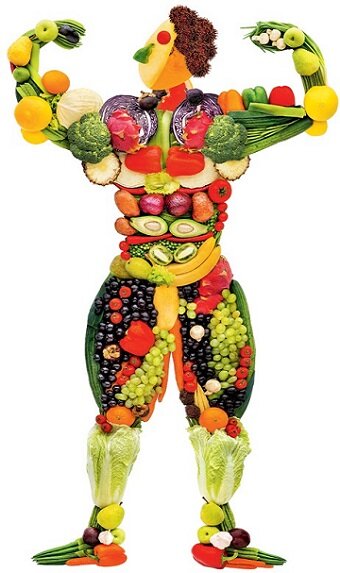Organic Garden Fertilizers
Great homemade and commercial organic fertilizer and soil amendment ideas. Guaranteed to put hairs on the chest of your vegetables!

Yes indeed, these natural nutrients will beef up your harvests and add muscles to your crops.
Watch the admiring glances as your vegetables flex their pecs and GROW.
Here's a list of favourite food for vegetables; in fact for all your garden.
Time to mix up some plant food.
Oooh sweeeet — set the table for....
Liquid Fertilisers
Compost tea, seaweed tea, comfrey tea and other weed and herb teas for the garden are probably the most popular and easiest organic food made by gardeners around the world. Go here to read How to make liquid fertilizers and their uses and application.
Important Note: A mention about some of the following organic fertilizers and soil amendments.
People, especially farmers but also many home gardeners, like to experiment to make their plants grow better.
Many useful ideas come about whilst wandering over a paddock or messing around in one's patch. Sometimes a tip from one grower to another is passed on and gains credibility, perhaps when it shouldn't, or at least not without some more scientific reasoning applied to it!
Other alternative systems and products may seem to be successful within a certain time, area or application, but may not stand up with future use in different circumstances.
And again, it can happen that there are people for various reasons may be biased towards an idea and strongly promote it... maybe for financial gain or notoriety.
So, some of the fertilizers, additives, tonics and conditioners here are truly marvellous, some are so-so; and some are useless, and some are obviously unscientific 'snake oil.'
That's my opinion! I haven't tried some of these, so read my words with a grain of salt. I could be wrong, but I believe I can only truly endorse something that has worked for me or have personally seen or obtained proof of its success.
What works for me and has worked for others for many a century, goes something like this:
Put a layer of compost on the garden after growing and harvesting something. Then grow something again, then compost and so on.
An inch or so of grass clippings for mulch once or more a year will rot down to provide great fertilizer.
Free stuff... coffee grounds, leaves, animal manure, husks, hulls and howsomewhatevers all provide food for plants. You don't need to pay for expensive fertilizers!
Admittedly there are exceptions, whereby it's definitely worth investing in a specific additive because:
- You don't have compost
- You've had a soil test done and you need to add this, that or t'other
- You've just moved and your new garden area is solid clay or sand
- You've started a garden, but the soil is poor and it's growing season and you want fresh veggies quickly, so need to fertilize this season at least to get results
- Your plants have taken off, producing like crazy and you need a boost to keep them going and productive.
Here then are some products that definitely work, or may work for you... or who knows?
Bentonite Clay
Some plant fertilizers are really plant tonics. Seaweed and liquid seaweed tea is a good example, because brilliant as it is to help soils and promote growth, it does not contain much nitrogen to grow leaves.
Thus a plant tonic will be packed with trace elements, minerals and micro-nutrients which encourages helpful soil organisms, boosts strong root formation and strengthen plants to resist disease and climate fluctuations.
What is a Soil Conditioner?A soil conditioner is not a fertilizer either.
Soil itself is the breakdown of weathered rocks, plus organic matter.
Very fine particles of rock create clay soil and coarser particles make sandy soil.
Rocks contain trace minerals but rarely contain nitrogen which is needed for plant growth, so plants obtain nitrogen and other minerals and nutrients from pre-existing plants and animals decayed by bacterial action.
Organic growers supply these essential elements by adding mulch, compost, manure and so on. Non-organic growers use chemical fertilizers, which may eventually cause problems — that's another subject.
Meanwhile the soil needs organic matter as a conditioner. Spent mushroom compost for example is a great soil conditioner. It has much of its nitrogen and other nutrients used up by several mushroom crops, but its well aged straw and manure content is great for soils.
For sandy soils, a soil conditioner will help retain moisture and for clay soils a conditioner will help drainage and open up airways for roots and the likes of worms to move through easily.
There are several types of bentonite clay, from calcium bentonite, sodium bentonite and a few minor ones. It is mined from volcanic ash that has been weathered, usually in or around water or moisture. It's abundant worldwide, and being easy to mine, it's cheap and plentiful.
It's been called the 'healing clay' since the Middle Ages and used medically for its many uses both internally and externally. Natural clay baths, mud wraps and compresses are used for relieving pain, stimulating circulation, deodorizing, cleansing the skin and absorbing toxins. For personal use, such as external body use and ingesting internally... that's another subject and there is plenty of information out there to study this further.
In the home this clay neutralizes pet, smoke, cooking and other smells. Shaken onto musty, mouldy places before vacuuming and wiping down, it can be used on floors, in your refrigerator, rubbish bins and cupboards. It removes grease in kitchens, garage floors and even rubbed into clothes stains.
Garden uses for Bentonite Clay
Calcium bentonite is used for most garden and personal services. For sandy soils, it holds water well, so helps to keep nutrients in and provide a home for soil microorganisms.
Definitely one of the useful ways that Bentonite Clay can help in the garden is for moisture retention in sandy soils. When added to sandy soil, this light clay swells up, almost jelly-like and stops the soil from drying out. Unlike heavy clays, bentonite doesn't form lumps, so plants roots have no trouble obtaining moisture from their surroundings. Excellent for adding to soils in container plants.
Bentonite is marketed as a natural and complete soil fertilizer, containing over 60 trace minerals needed for plant growth. It has an alkalizing effect so should not be used around acid loving plants.
A light sprinkling several times a year over the soil, supplements and revitalizes the garden. Sprinkled in layers on compost it helps breakdown material into humus.
It can also be made into clay water to soak cuttings in, paint on pruning cuts, and pour around plants. Mix 1-part clay to 10 parts water and stir well.
When sprayed onto plants it forms a light mineral shield which repels pests and prevents certain diseases. This coating is also useful in hot climates to prevent sun damage.
To use bentonite clay as a spray, mix 1 cup of clay to 4 cups of water (4 cups is 1 liter or 2 pints). Add a small squirt of detergent, approximately 1 teaspoon, to help the spray stick to leaves.
Sodium bentonite swells and holds far more water than other bentonite clays. It is used successfully instead of plastic to line ponds with and wicking beds for drought-prone areas.
You can buy Bentonite Clay from Pottery suppliers, some farm and hardware suppliers, natural health and beauty stores, and online.
Biochar
Biochar is a form of charcoal and has an interesting history of use for growing plants. Read more on this page Making and using Biochar for the garden and how much to use.
Hydrogen Peroxide
Certainly hydrogen peroxide is handy in the home, from stopping tooth infections to wiping down surfaces, and 101 other uses.
In the garden, either as a general fertilizer, fungicide or weedkiller, H2O2 would be quite expensive, but you may be able to buy it more cheaply, or in bulk where you are.
A 3% concentrate solution is usually used for home or personal use, and the garden is the same. Higher concentrations can be dangerous and can burn skin and eyes. If you buy hydrogen peroxide at a stronger concentration such as 10% or more, remember to handle carefully when diluting with water before use.
Advocates of hydrogen peroxide for plant use, do so because it is a powerful oxidizer. As it combines with outside air and water it decomposes, freeing its oxygen elements. Thus it provides a supplement of oxygen to plants and aerates the soil.
Here are some ways to use Hydrogen Peroxide in the Garden
- As a general fertilizer to enhance plant growth, use 1 teaspoon of 3% hydrogen peroxide to 1 cup of water or ½ cup H2O2 to 4 liters (1 gal).
-
Use as a foliar spray or soil soak to help produce strong, healthy roots.
Use to water newly sown seeds, or even to soak seeds in before planting.
Use this mixture when rooting cuttings, either in the water they soak in or in the soil they are in.
- To deter and kill of mold, bacterial and fungal infections, double the above concentration at least, ie: 2-3 teaspoons per cup of water, or 1¼ cup per 4 litres (1 gal).
Spray on top and under leaves to combat blight, downy mildew and other fungal spores. Water in around plants to treat collar and root rot, and soil born pests.
To stop infections, paint or spray on pruning cuts. Dip secateurs in mixture to sterilize them.
- To use as a weed killer, apply neat strength. If you can buy a stronger concentration than 3%, say 10%, this is more effective for killing weeds.
Urine
There are no doubts about the effectiveness of this near perfect, soluble fertilizer on your garden. I'll leave it to your imagination how you can go about getting it around your plants!
Urine is sterile. Neat or diluted, it is a popular compost activator. Pour it on because it's loaded with nitrogen as well as potassium and phosphorous. The nitrogen is in the form of urea which is the ideal form for soil uptake and fertilizing plants.
Ways to use urine in the garden
Urine should be used as fresh as possible to fertilize your plants, but if that's not always possible, put a lid on the jar or container immediately. Urine that's been left in the air for a while will be busy converting urea into ammonia — your compost pile will still love it though.
For pouring around the roots of your vegetables and other plants, dilute 1 to 10 with water (keep a handy watering can near the back door). For younger plants and seedlings, dilute 1 to 20 with water, and for container plants dilute 1 to 30 with water.
Don’t worry about exact strengths, it's just that urine is high in nitrogen and has a lots of mineral salts in it, so can burn plants. These salts are a good reason to try to avoid applying urine to plant leaves; it's best to pour in the soil around plants.
Apply weekly to fast growing and large plants, less often to very young and slower growing plants.
Now you know how to produce bucketloads of organic vegetables and other beautiful plants.
Whatever you choose to put on your garden, may your patch be productive!
Another useful and easy organic fertilizer you can make is plant tea. If you have compost or can collect some seaweed, comfrey and other plants, rustle up a homemade brew. See Making Compost Tea and other Soluble Fertilizers
Also on a similar subject: More garden materials such as mulch, manures, amendments and organic soil conditioners





